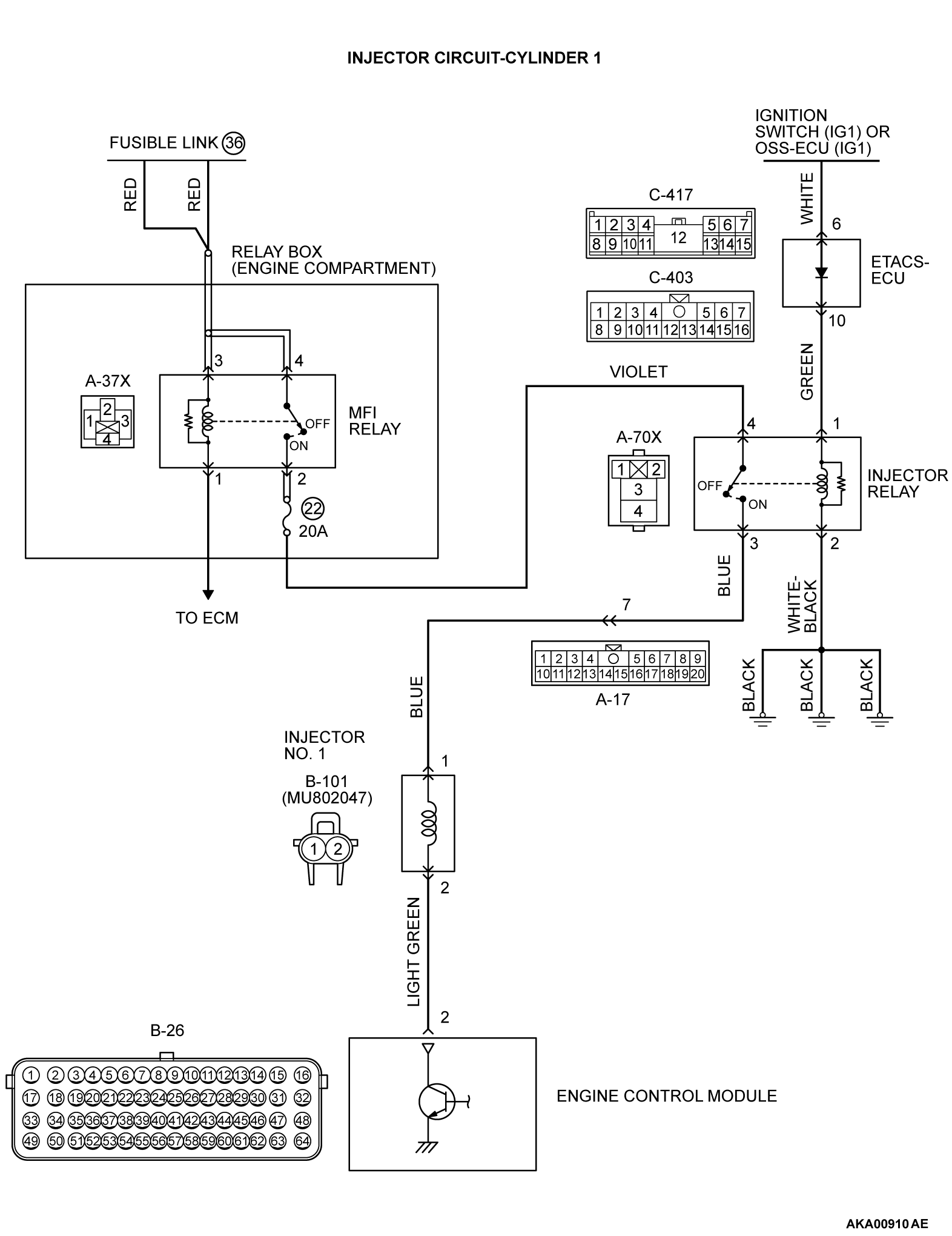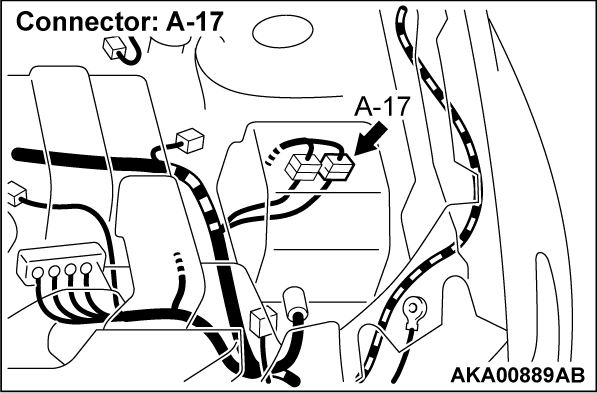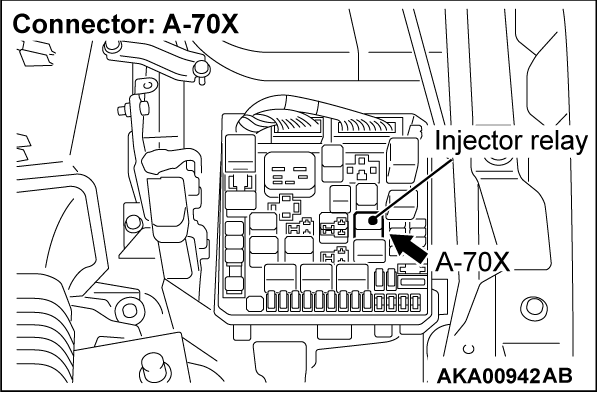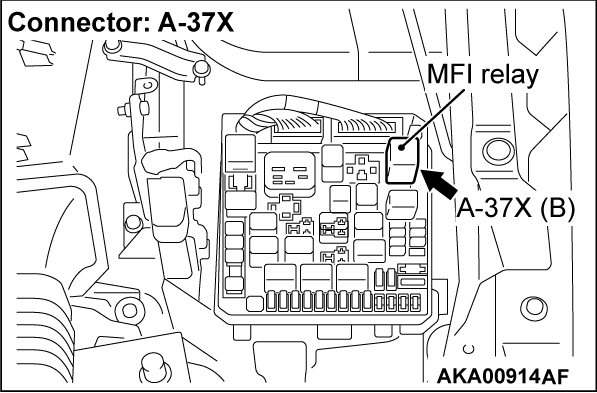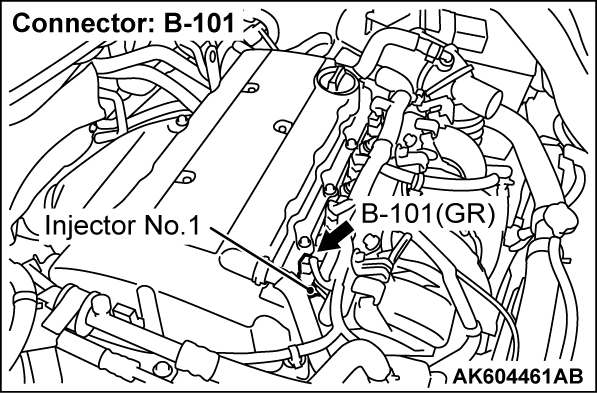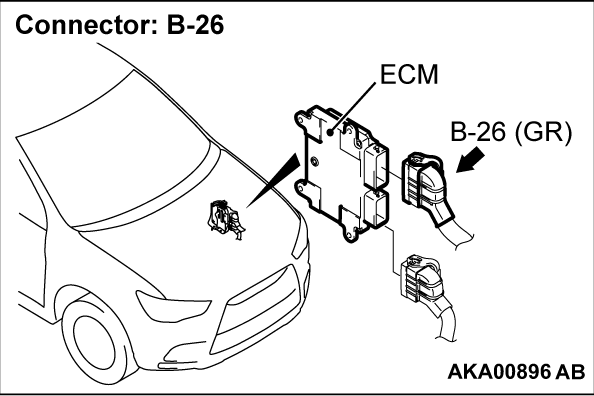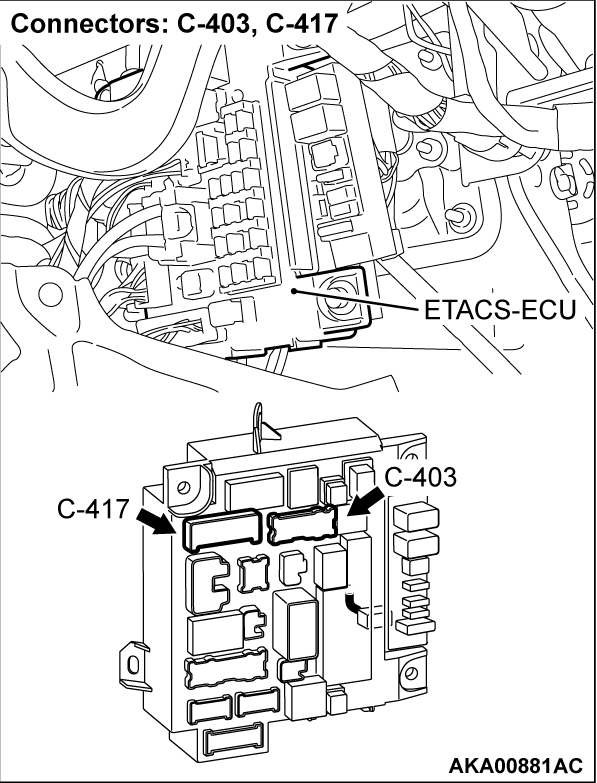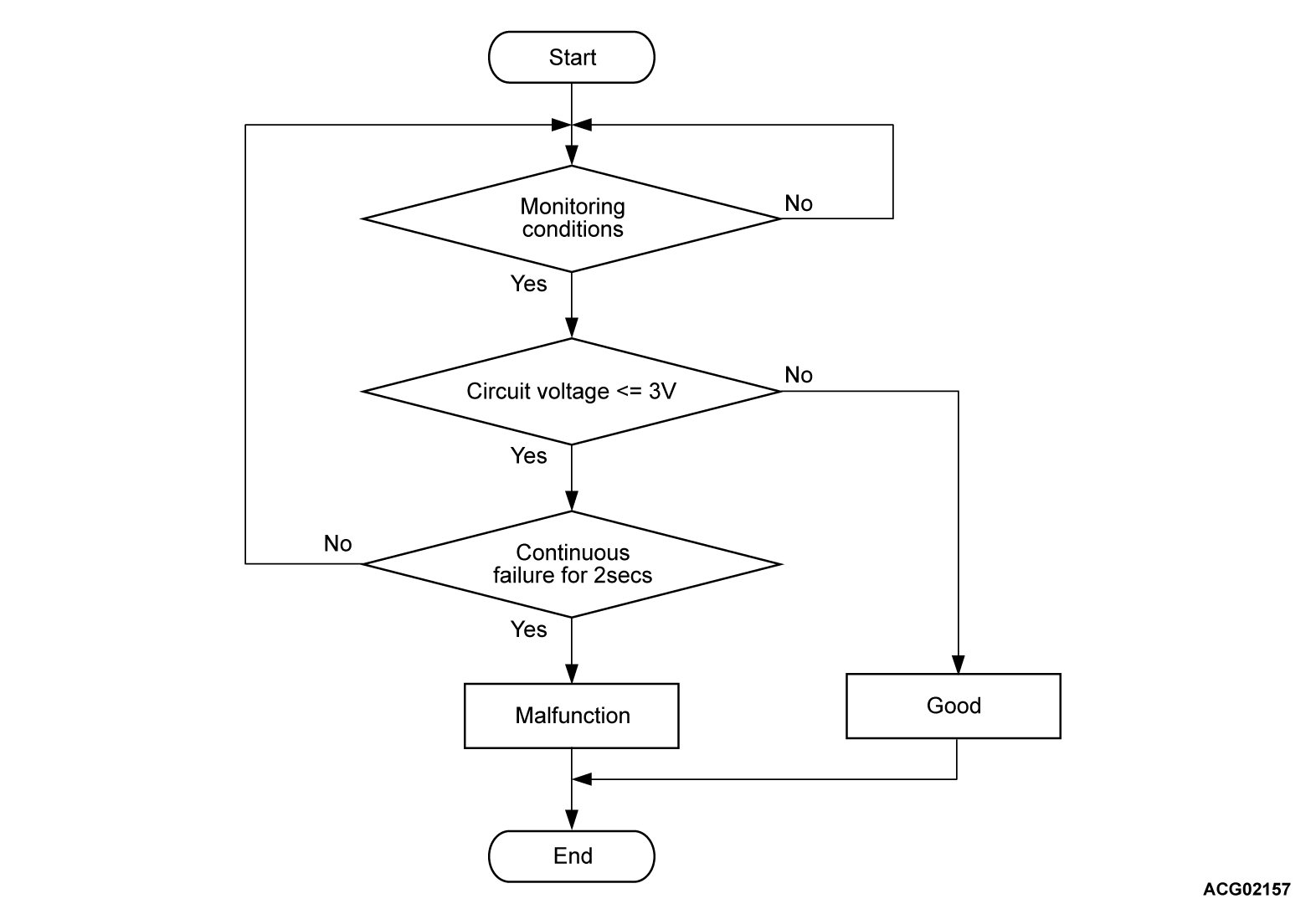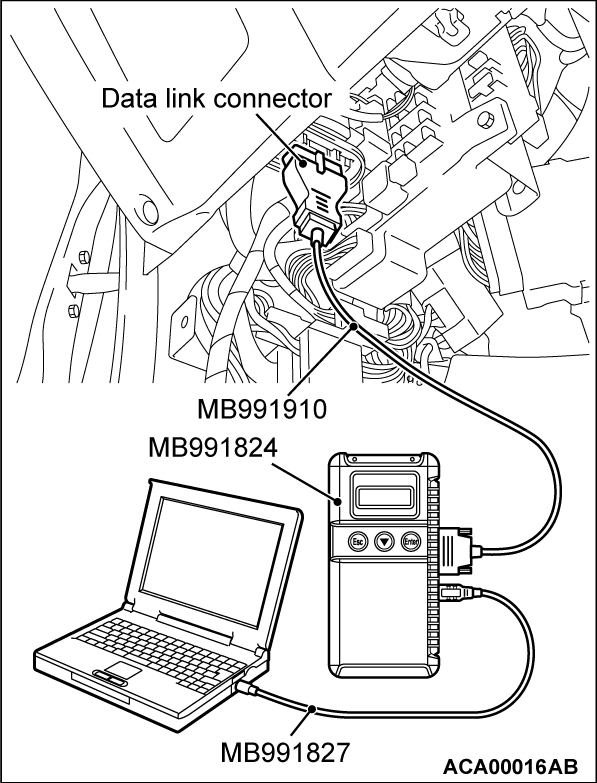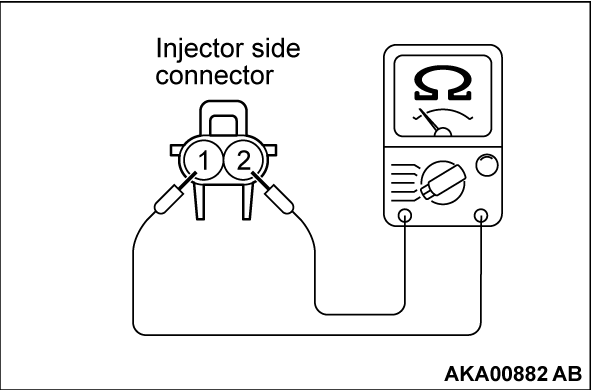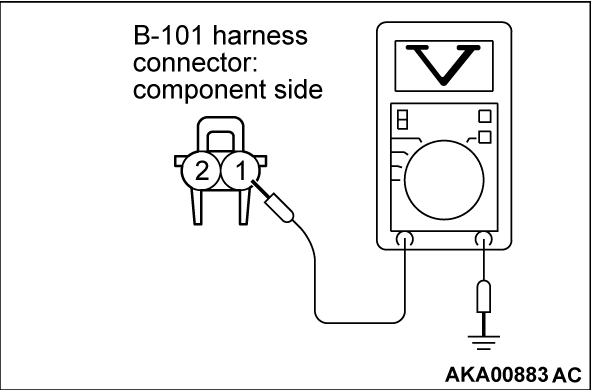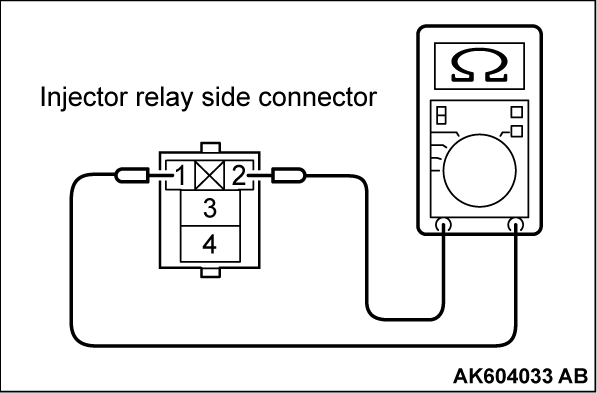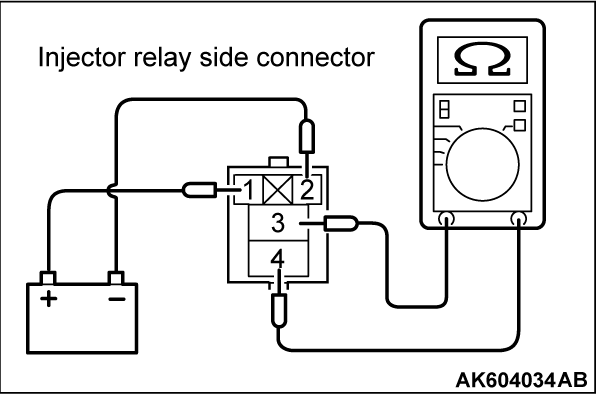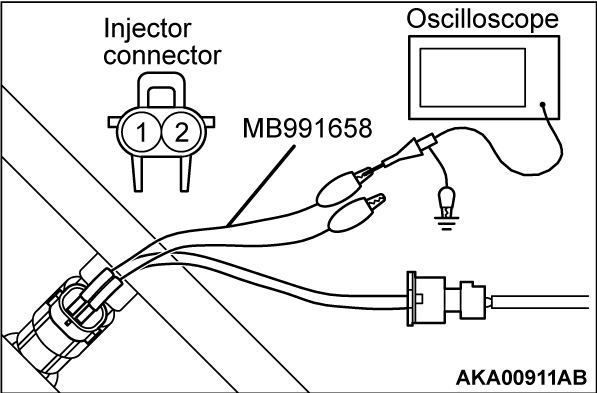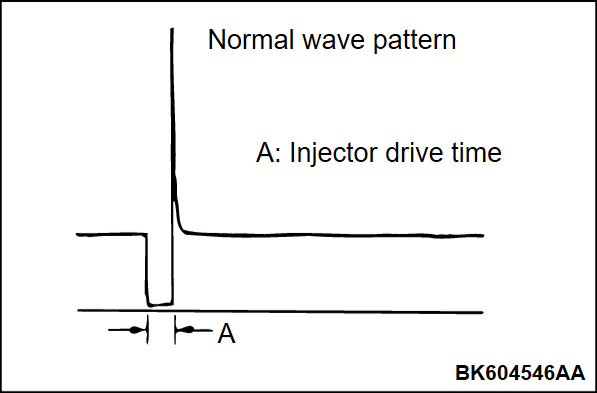DTC P0261: Injector Circuit Low Input - Cylinder 1
CIRCUIT OPERATION
- The injector power is supplied from the MFI relay.
- The ECM controls the injector by turning the power transistor in the ECM "ON" and "OFF".
TECHNICAL DESCRIPTION
- The amount of fuel injected by the injector is controlled by the amount of continuity time the coil is grounded by the ECM.
DESCRIPTIONS OF MONITOR METHODS
- The ECM detects open circuit and short malfunction.
MONITOR EXECUTION
- Continuous
MONITOR EXECUTION CONDITIONS (Other monitor and Sensor)
Other Monitor (There is no temporary DTC stored in memory for the item monitored below)
- Not applicable
Sensor (The sensor below is determined to be normal)
- Not applicable
DTC SET CONDITIONS
Check Condition
- Engine is running.
- Battery positive voltage is between 10 and 16.5 volts.
Judgment Criterion
- The supply voltage is less than 3 volts without the injector driving for 2 seconds.
FAIL-SAFE AND BACKUP FUNCTION
- None
TROUBLESHOOTING HINTS (The most likely causes for this code to be set are:)
- No. 1 cylinder injector failed.
- Open or shorted No. 1 cylinder injector circuit, harness damage or connector damage.
- ECM failed.
DIAGNOSIS
Required Special Tools:
- MB991958: Scan Tool (M.U.T.-III Sub Assembly)
- MB991824: V.C.I.
- MB991827: USB Cable
- MB991910: Main Harness A
- MB991658: Test Harness
- MB992110: Power Plant ECU Check Harness
STEP 1. Using scan tool MB991958, check actuator test item 1: Injectors.
| caution | To prevent damage to scan tool MB991958, always turn the ignition switch to the "LOCK" (OFF) position before connecting or disconnecting scan tool MB991958. |
(1) Connect scan tool MB991958 to the data link connector.
(2) Start the engine and run at idle.
(3) Warm up the engine to normal operating temperature: 80°C to 95°C (176°F to 203°F).
(4) Set scan tool MB991958 to the actuator testing mode for item 1 Injectors.
- The idle should become slightly rougher.
(5) Turn the ignition switch to the "LOCK" (OFF) position.
Is the actuator operating properly?
STEP 2. Check harness connector B-101 at No. 1 cylinder injector for damage.
Is the harness connector in good condition?
STEP 3. Check the No. 1 cylinder injector.
(1) Disconnect the No. 1 cylinder injector connector B-101.
(2) Measure the resistance between injector side connector terminal No. 1 and No. 2.
Standard value: 10.5 - 13.5 Ω [at 20°C (68°F)]
Is the measured resistance between 10.5 and 13.5 Ω [at 20°C (68°F)]?
STEP 4. Measure the power supply voltage at No. 1 cylinder injector harness side connector B-101.
(1) Disconnect the connector B-101 and measure at the harness side.
(2) Turn the ignition switch to the "ON" position.
(3) Measure the voltage between terminal No. 1 and ground.
- Voltage should be battery positive voltage.
(4) Turn the ignition switch to the "LOCK" (OFF) position.
Is battery positive voltage (approximately 12 volts) present?
STEP 5. Check harness connector A-70X at injector relay for damage.
Is the harness connector in good condition?
STEP 6. Check the injector relay.
(1) Remove the injector relay.
(2) Check for continuity between the injector relay terminal No. 1 and No. 2.
- There should be continuity.
(3) Use jumper wires to connect injector relay terminal No. 1 to the positive battery terminal and terminal No. 2 to the negative battery terminal.
(4) Check for continuity between the injector relay terminal No. 3 and No. 4 while connecting and disconnecting the jumper wire at the negative battery terminal.
- Continuity (2 ohms or less). <Negative battery terminal connected>
- Should be open loop. <Negative battery terminal disconnected>
(5) Install the injector relay.
Is the measured resistance normal?
 Check harness connector A-17 at intermediate connector for damage, and repair or replace as required. Refer to GROUP 00E, Harness Connector Inspection
Check harness connector A-17 at intermediate connector for damage, and repair or replace as required. Refer to GROUP 00E, Harness Connector Inspection  . If intermediate connector is in good condition, repair harness wire between injector relay connector A-70X (terminal No. 3) and No. 1 cylinder injector connector B-101 (terminal No. 1) because of open circuit. Then go to Step 13
. If intermediate connector is in good condition, repair harness wire between injector relay connector A-70X (terminal No. 3) and No. 1 cylinder injector connector B-101 (terminal No. 1) because of open circuit. Then go to Step 13 .
.STEP 7. Check harness connector A-37X at MFI relay and harness connector A-70X at injector relay for damage.
Are the harness connectors in good condition?
STEP 8. Check of short to ground, open circuit and harness damage between MFI relay connector A-37X (terminal No. 2) and injector relay connector A-70X (terminal No. 4).
STEP 9. Check of short to ground, open circuit and harness damage between injector relay connector A-70X (terminal No. 3) and No. 1 cylinder injector connector B-101 (terminal No. 1).
| note | Check harness after checking intermediate connector A-17. If intermediate connector is damaged, repair or replace it. Refer to GROUP 00E, Harness Connector Inspection  . Then go to Step 13 . Then go to Step 13 |
Is the harness wire in good condition?
STEP 10. Check harness connector B-26 at ECM for damage.
Is the harness connector in good condition?
STEP 11. Check for open circuit, short circuit to ground and harness damage between No. 1 cylinder injector connector B-101 (terminal No. 2) and ECM connector B-26 (terminal No. 2).
STEP 12. Using the oscilloscope, check the No. 1 cylinder injector.
(1) Disconnect the No. 1 cylinder injector connector B-101 and connect the test harness special tool MB991658 between the separated connectors. (All terminals should be connected.)
(2) Connect the oscilloscope probe to the injector side connector terminal No. 2.
| note | When checking with the ECM side connector, disconnect all ECM connectors. Connect the power plant ECU check harness special tool MB992110 between the separated connectors. Then connect the oscilloscope probe to the check harness connector terminal No. 2. |
(3) Start the engine and run at idle.
(4) Check the wave pattern.
- The wave pattern should show a normal pattern similar to the illustration.
(5) Turn the ignition switch to the "LOCK" (OFF) position.
Is the wave pattern normal?
![[Previous]](../../../buttons/fprev.png)
![[Next]](../../../buttons/fnext.png)
